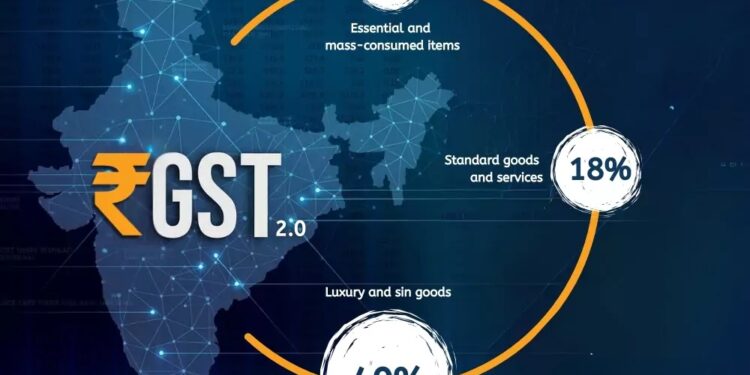In a major restructuring of India’s indirect tax system, the GST Council has approved a sweeping reform to simplify the tax regime. Effective September 22, 2025, the four existing GST slabs (5%, 12%, 18%, 28%) will be rationalised into just two main slabs – 5% and 18% – along with a special 40% rate applicable to “sin goods” and super luxury items.
Union Finance Minister Nirmala Sitharaman announced the decision after the 56th GST Council meeting, calling it a “historic step towards ease of living and ease of doing business.”
40% GST for Sin and Super Luxury Items
The Council introduced a flat 40% GST on products and services deemed luxury or harmful, including:
-
Pan masala, tobacco products, cigarettes
-
Aerated drinks with added sugar, caffeinated and non-alcoholic beverages
-
Cars exceeding 1,200cc (petrol) or 1,500cc (diesel) and longer than 4,000 mm
-
Motorcycles above 350cc, racing cars
-
Yachts and aircraft for personal use
This move replaces the previous 28% GST plus compensation cess, significantly raising the total tax burden on these categories.
Relief for Households and Common Goods
Alongside the higher levy on luxury items, the government slashed taxes on hundreds of consumer goods and services, focusing on household affordability:
-
Soaps, toothpaste, small appliances, and small cars will now be taxed at 18% instead of 28%
-
Individual life and health insurance policies are now completely exempt from GST
-
Rate cuts were extended to farming equipment, benefiting the agriculture sector
-
Labour-intensive industries such as textiles and footwear will see cheaper input costs
Prime Minister Narendra Modi welcomed the reforms, calling them a “Diwali gift to the people” and affirming they will “improve lives and promote small business growth.”
States’ Concerns and Cooperative Federalism
Some opposition-ruled states expressed concerns over revenue losses. Kerala Finance Minister KN Balagopal sought compensation, while J&K Chief Minister Omar Abdullah warned that his region’s revenue could fall by 10-12% given its post-crisis fiscal situation.
Despite the concerns, the Council reached a unanimous decision, with Sitharaman praising the “spirit of cooperative federalism.”
Boost for Demand Amid Global Trade Headwinds
Experts said the timing of the cuts is crucial as India faces a challenging global environment, including 50% tariffs on Indian exports to the US, the highest in the world.
Economists believe the move will boost domestic demand, spur consumption ahead of the festive season, and provide much-needed relief to middle-class households.




























